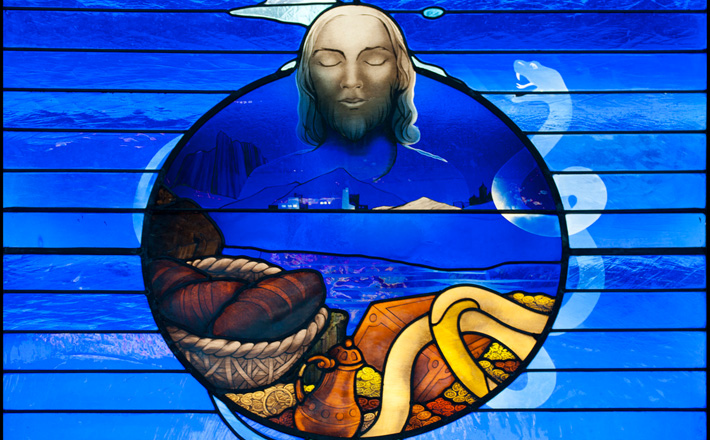Commentary on Psalm 32
Psalm 32 is one of the six psalms the church traditionally identified for the rite of penance and to help model prayers of confession (the others are Psalms 6; 38; 51; 102; 130; 143).
Therefore, the psalm is quite appropriate for use on the first Sunday of Lent.1
As with many of the so-called penitential psalms, however, Psalm 32 does not offer confession of sin though confession and penance are primary themes. The psalm does not so much make confession as it teaches why confession is crucial, how to make it, and the nature and extent of its benefits. It teaches these lessons by means of a prayer of thanksgiving for healing (verses 3-5).
The psalm begins with a double beatitude that declares “happy” those who know God’s forgiveness (verses. 1-2). This contributes to a major theme in the Psalms and particularly in Book I of the Psalter in which the word “happy” (Hebrew ?ashrê) frames the section (see Psalms 1:1; 2:12; 40:1).2 The translation “happy” may be misleading given the modern understanding of this word. Happiness here refers to the joy and contentment of depending on God. Thus, some translations prefer the more traditional “blessed.” The word “happy,” however, gives the preacher opportunity to redefine this word for the congregation. For those who seek God’s forgiveness, the experience of divine pardon and being reconciled with God are the primary marks of “happiness.”
Verses 1-2 include four poetic lines. The first three emphasize the lord as forgiving agent, with the third making a direct statement: “Happy are those to whom the lord imputes no iniquity” (verse 2a). The fourth line, however, identifies the person’s stance before God as a source of happiness: “in whose spirit there is no deceit” (verse 2b). Thus, the focus on confession of sin fits with the Psalter’s central concern for dependence on God in that confession is part of the humility necessary to live rightly before God.
In verses 3-5 the psalmist recalls sickness and the prayer offered to God for relief. The prayer the psalm reports implies that God caused the bodily ailment because of the psalmist’s sinfulness (“your hand was heavy upon me,” verse 4a). Healing came after confession (verse 5a) as the result of forgiveness (verse 5b). The remainder of the psalm uses this experience to instruct others in how to stand before God: “let all who are faithful offer prayer” (verse 6); “do not be like a horse or a mule” (verse 9); “be glad in the lord and rejoice, O righteous” (verse 11).
It is tempting to read verses 3-5 as an expression of a narrow retribution theology. According to this theology, God strikes sinners with bodily ailments because of their misdeeds. A close reading of the entire psalm, however, requires a more nuanced understanding of sin, sickness, and confession.
Prayer is characteristic of the faithful and is a primary sign of their dependence on God; by calling on God, they find in God a “hiding place” in time of trouble (verses 6-7). This is the nature of those the psalm calls “righteous” and “upright” (verse 11). In other psalms the psalmist complains that the wicked, who do not call out to God, are sound of flesh (Psalm 73:4, “their bodies are sound and sleek”). To be sure, the psalmist insists this will not always be the case (Psalm 73:17-20). But at present the wicked seem unaffected by God’s judgment because they simply give it no weight.
Therefore, Psalm 32 suggests that physical infirmity is not so much God’s punishment of sin as it is the natural result of a sick spirit, and only those aware of that inner imbalance feel the accompanying physical malady. So ironically it is the righteous who suffer from sin because they are aware of God’s judgment, while the wicked simply ignore it. The righteous also confess their sins precisely because they feel the authority of God on their lives and thus find healing and wholeness.
Verses 6-7 continue to address to God by drawing the psalmist’s experience of confession together with that of all the faithful. NRSV interprets the verb in verse 6 as a jussive that expresses a wish for all people of faith to offer prayer (verse 6). Equally plausible is that the verb simply states the typical practice of the pious.
The word for “faithful” (hasidîm) in the Psalter has the connotation of “pious ones” or “saints” (Psalms 30:5; 31:24; 37:28; 85:9; 149:1, 5). Whether a wish or a statement of the current state of affairs, the psalm makes clear that the faithful are those who pray and confess their sins. As Calvin says, they “betake themselves to prayer, which is the true sacrifice of faith.”3 The psalmist reinforces this connection with assurance that God is a “hiding place” (see similar references to God as “refuge” as in Psalm 2:12). God preserves the psalmist from trouble and surrounds him with joy (verse 7).
In the final portion of the psalm (verses 8-11) the psalmist instructs the audience directly in the benefits of prayer and confession: “do not be like a horse or a mule” (verse 9); “be glad in the lord,” “rejoice,” “shout for joy” (verse 11). Verse 10 gives the primary motivation: “Many are the torments of the wicked, but steadfast love surrounds those who trust in the lord.”
It may not be coincidence that the word meaning “I will instruct” (?askil) in verse 8 comes from the same root as the label for the psalm, “a maskil.” What is certain is the psalm as a whole has this purpose. The primary lesson is that repentance and a contrite heart are crucial for the life of faith and are characteristic of the righteous (see also. Psalm 51:17 [19]).
Notes:
1 See Clare Costley King’oo, Miserere Mei: The Penitential Psalms in Late Medieval and Early Modern England (Notre Dame, Ind.: University of Notre Dame Press, 2012)
2 J. Clinton McCann, Jr., “The Shape of Book I of the Psalter and the Shape of Human Happiness,” in The Book of Psalms: Composition and Reception (eds. Peter W. Flint and Patrick D. Miller, Jr.; Leiden: Brill, 2005), pp. 340-48.
3 John Calvin, Commentary on the Book of Psalms, vol. 2 (trans. James Anderson; Grand Rapids, Mich.: Eerdmans, 1963), p. 532.


March 5, 2017